Mark Yoshimoto Nemcoff's Blog, page 7
April 4, 2013
Empty Spaces: Backwards Messages, Stairway to Heaven and a Failure to Communicate
 I’d like to show you what this song actually all about. Below is an excerpt from my book “Tearing Down The Wall: A Contemporary Guide to Decoding Pink Floyd – The Wall One Brick at a Time.” I’ve added a few videos from YouTube to help demonstrate some of the backwards messages here in “Empty Spaces” as well as the creepy backmasking in Led Zeppelin’s iconic “Stairway to Heaven.”
I’d like to show you what this song actually all about. Below is an excerpt from my book “Tearing Down The Wall: A Contemporary Guide to Decoding Pink Floyd – The Wall One Brick at a Time.” I’ve added a few videos from YouTube to help demonstrate some of the backwards messages here in “Empty Spaces” as well as the creepy backmasking in Led Zeppelin’s iconic “Stairway to Heaven.”
EMPTY SPACES – From “The Wall” by Pink Floyd.
The ghostly wisps of airport terminal ambience and faces from the past fade; the journey now reaches at its next destination. Our arrival point now pulsates with a mechanical rhythm conveying the essence an assembly line of some sort. The synth and guitar play a subdued, darker, much more sinister version of “In the Flesh.”
In many regards, this industrial throbbing percussion in “Empty Spaces” makes the song feel like a blood cousin to “Welcome to the Machine” from the band’s smash album Wish You Were Here. Even lyrics from “Welcome to the Machine” seem to echo from the same DNA of disillusionment found throughout The Wall.
What did you dream? It’s alright. We told you what to dream.
The musical separation from the living, breathing, organic sound of the finger-picked acoustic nylon-string guitar of “Goodbye Blue Sky” to this synth-driven conveyor belt heightens the sense that we have been torn from the innocence of Pink’s youth. There is no more free pass from obligation that childhood often affords us. Now, as a young adult, Pink is faced with the obligations of manhood.
Primarily those which come with romantic entanglements.
Is this some sort of Brave New World for Pink? Is this a world filled with the Futurist’s embrace of technology that separates us from our loved ones and, more dangerously, ourselves?
Narratively-speaking, Pink now remembers himself as a young adult. The years have not been kind. Throughout his upbringing, his unstable relationship with his own place in the world has deeply affected his ability to connect with others and form true relationships.
Is he now paying dearly for it, because inside of his soul he now feels these “Empty Spaces?”
As a work that deals with the erosion of sanity and its effects upon relationships, The Wall contains surprisingly few overt references to Syd Barrett, the founding member whose LSD addiction fried his brain and forced him out of the band. Perhaps Roger felt he had excised Syd’s spirit with Wish You Were Here’s infamous ode to Syd, “Shine on You Crazy Diamond.”
That being said, there are moments in The Wall that feel like we are being visited briefly by the ghost of Syd’s presence in the band and in Roger’s life. Remember, Syd was Pink Floyd’s original lead singer and songwriter; it was only after Syd’s mental breakdown and subsequent curb-kicking that Roger began his brilliant career as a songwriter. In this case, however, it’s not so much a visit from Syd’s ghost as an embodiment of the man but instead as a form of cautionary tale.
“Empty Spaces” is a song about failed communication.
What shall we use to fill the empty spaces where we used to talk?
Of all the clichéd audio trickery allegedly found in rock record audio production of the era, backmasking was not a Pink Floyd hallmark. This practice of searching for backwards messages, intentionally inserted into recorded music in order to deliver a subliminal message, really didn’t hit the mainstream until 1969 when a caller at a Detroit rock radio station convinced disc jockey Russ Gibb to play The Beatles’ “Revolution 9” in reverse. Therein, explained the caller, were clues to prove the rumors of Paul McCartney’s death were indeed true. When played backwards, the phrase “Number nine” became obvious — to some people — as “turn me on dead man.” When other listeners tried this sonic experiment on their turntables at home, the station’s switchboards lit up. According to them, the mix also contained buried, backwards recordings of a car crash and the voice of someone screaming, “Let me out!”
Record companies and artists scoffed, citing the phenomenon of “phonetic reversal,” wherein a word sounds like another word when reversed. This did not deter some rabid backmasking hunters from convincing themselves that these subliminal messages were not only subversive in nature, but also boldly satanic.
Possibly one of the greatest examples of backmasking paranoia stems from claims that one of the most famous rock songs ever recorded, “Stairway to Heaven,“ is filled with backwards praise of the devil himself.
Right after the bridge of “Stairway” Robert Plant sings:
If there’s a bustle in your hedgerow, don’t be alarmed now
It’s just a spring clean for the May queen
Yes, there are two paths you can go by, but in the long run
There’s still time to change the road you’re on
Without getting too analytical about the lyrics within the context of the song, “Stairway to Heaven” is really about a spirit quest of sorts, harkening back to legendary pursuits like King Arthur’s grail quest or Homer’s Iliad.
The mythical quality of the song’s narrative also lends itself to shades of Paganism. The reference to the May Queen invokes an ancient ritual in which a virgin clad in white was chosen to lead a parade for May Day in celebration of spring. After being crowned with flowers though, a sinister fate awaits our lovely May Queen — for in this pagan ritual, she becomes the victim of human sacrifice.
Also quite undeniable is the allusion that the two paths and the choice to change one’s road refers to the spiritual destination that awaits at the end of this long journey.
That being said, it’s probably not that ridiculous to understand why some self-appointed backmasking detectives believe that when this section of the song is played in reverse, you clearly hear is:
Oh, here’s to my sweet Satan
The one whose little path would make me sad, whose power is Satan
He will give those with him 666
There was a little tool shed where he made us suffer, sad Satan
Before you give yourself severe ocular strain from rolling your eyes too hard, take a listen for yourself. (It probably helps to be really high when you do.) Most likely you will find these supposed backwards lyrics to be the product of overactive imaginations belonging to those who strive to find something hidden where nothing exists.
What makes this all very interesting is that “Empty Spaces,” a song about failed communication, actually does contain its own backmasking!
Essentially a joke of Roger Waters’ own creation, it contains a certain poignancy that helps give this song a very deep meaning within the context of Pink Floyd’s history and the tragic story of Syd Barrett.
Beginning at approximately 1:12 into the song there is an obviously unhidden garbled audio element in the mix. Played backwards you can clearly hear what is being said.
“Hello looker,” Roger Waters begins. “Congratulations. You have just discovered the secret message. Please send your answer to Old Pink in care of the Funny Farm, Chalfont…”
Then cutting him off before he can deliver the entire address you hear recording engineer James Guthrie call out, “Roger! Carolyne’s on the phone!”
To which Roger replies, “Okay.”
Considering that original Floyd singer Syd Barrett had been institutionalized in a mental hospital, it’s easy to see how this could refer to him, though not as lovingly as in “Shine On You Crazy Diamond.”
The “Carolyne” in question is no doubt Carolyne Waters, Roger’s second wife. In the past, Waters has publicly stated that if it had not been for Carolyne’s insistence on communication between them, he would have ended up as crazy as Pink.
Or perhaps Syd.
It’s worth mentioning that the use of Roger’s real wife’s name is the first time we are removed from The Wall’s fictional universe by something directly from the real world. However, that may be precisely the point. In order to illustrate the many layers in The Wall and to momentarily remind us that it’s a metaphor, he uses Carolyne as a grounding point to give us the right perspective and see the work for what it is.
Things get really interesting in “Young Lust.” I invite you to check out “Tearing Down The Wall” if you want to know more about the hidden meanings, messages and the incredible way the audio in The Wall was shaped to tell its own story-within-the-story.









Welcome to Mindproduct – A Free Digital Magazine for Flipboard
 The modern digital magazine takes “lean forward” content created for the web and transforms it back into the “lean back” experience we grew up with thanks to traditional media. Perhaps, that’s why I’m enamored with it.
The modern digital magazine takes “lean forward” content created for the web and transforms it back into the “lean back” experience we grew up with thanks to traditional media. Perhaps, that’s why I’m enamored with it.
That’s why I’m happy to tell you about MINDPRODUCT, my new digital magazine for Flipboard. Thought-provoking and evocative, Mindproduct will not be your father’s mag.
What Flipboard has done with their latest update allows me to showcase content I’ve created and curated in a digital magazine format that is accessible for iPhone, iPad and Android. You can get and read Mindproduct on your smartphone or tablet anywhere and I know a lot of you are already users.
Best of all, I can do it in a way that is easy to use, simple to navigate and is constantly evolving. All you have to do is subscribe once and you’ll be receiving all new Mindproduct content as it happens.
 I have some really cool ideas in mind for Mindproduct, and along with my own stuff I will be featuring work by amazing artists that you may or may not have heard of before. In the first pages of Mindproduct, you’ll see Blake Morgan’s new music video for his single, “Water, Water, Everywhere” from his upcoming album, Diamonds in the Dark. Coming soon will be some very funny stuff from my pal Brian Dunn that I know you’ll really dig. I think it will be a lot of fun to watch the evolution of this digital magazine as it happens.
I have some really cool ideas in mind for Mindproduct, and along with my own stuff I will be featuring work by amazing artists that you may or may not have heard of before. In the first pages of Mindproduct, you’ll see Blake Morgan’s new music video for his single, “Water, Water, Everywhere” from his upcoming album, Diamonds in the Dark. Coming soon will be some very funny stuff from my pal Brian Dunn that I know you’ll really dig. I think it will be a lot of fun to watch the evolution of this digital magazine as it happens.
Did I mention that it’s FREE?
 So? What are you waiting for? CLICK HERE to get your FREE Mindproduct digital magazine for Flipboard. And if you don’t have Flipboard installed on your iPhone, iPad or Android device, you can get that for free, too! Android app on Google Play - iOS app for iPhone and iPad
So? What are you waiting for? CLICK HERE to get your FREE Mindproduct digital magazine for Flipboard. And if you don’t have Flipboard installed on your iPhone, iPad or Android device, you can get that for free, too! Android app on Google Play - iOS app for iPhone and iPad









Diary of a Madman – Listen to Chapter 1 of the Audiobook
DIARY OF A MADMAN is serial killer thriller that is not for the faint of heart. One listen and you’ll understand why. Filled with graphic violence and sex, it’s a tale of darkness and horror that may not only keep you awake at night, but also force you to look at your co-workers in a very different light.
Also, check out the wonderful narration on the Diary of a Madman trailer by the late, great Don LaFontaine.
Get the DIARY OF A MADMAN audiobook:
or get it for
Kindle / Nook / iBooks / Kobo / Paperback









YOUR MISSION – an excerpt from “Go Forth and Kick Some Ass” by the Rev. MYN.
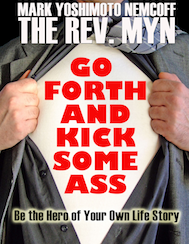 I love spring. I look at it as a season that feels so full of amazing possibilities. It wasn’t always like that though. For too long I was my own worst enemy, until I realized one amazing thing: The obstacles in your life do not prevent you from living your life. The obstacles in your life are your life.
I love spring. I look at it as a season that feels so full of amazing possibilities. It wasn’t always like that though. For too long I was my own worst enemy, until I realized one amazing thing: The obstacles in your life do not prevent you from living your life. The obstacles in your life are your life.
YOUR MISSION – from the book “Go Forth and Kick Some Ass” by the Rev. MYN.
Beware the Boogeyman for he is real.
Not flesh and blood, for flesh and blood can be stopped with a silver bullet or a stake to the heart; the Boogeyman is as real as any monster you can imagine and believe me, twice as dangerous.
No matter how far you run, he can catch you.
No matter where you hide, he can find you.
The Boogeyman lives in the shadows of your mind, in the dark crevices of your consciousness waiting to spring out and kill your happiness. Kill it dead. Slice its beating heart out and show it to your face as your terrifying scream is locked in your throat with no escape.
And the Boogeyman does this by way of its two greatest spells that it will attempt to cast upon you like some kind of evil wizard in the night.
Fear and Doubt.
You know the Boogeyman. You have met him. You have felt the touch of his icy fingers against your skin and watched the gooseflesh raise upon your arms in tiny bumps.
The Boogeyman is your mortal enemy. If you let him get close he will keep you from that which you desire most:
Success. Happiness. Contentment.
If you let the Boogeyman control your actions, he will take over your life and treat you like a puppet on a string. He will destroy everything you’ve worked to create. He will strangle your hopes and dreams.
Fear and Doubt. Doubt and Fear.
Those two things will derail you from your path and once the Boogeyman hits you with one of these debilitating emotions, it’s not long before the other will breed inside of you like a blackened evil seed full of poison.
Fear and Doubt are the most powerful forces that can keep you from finding success. Alone or together they can paralyze you.
Close your eyes. Imagine the following:
Red wire. Green wire. Timer counting down.
You gonna cut one or just watch the clock run down to zero?
Can you even imagine having to make a decision like that? Red wire. Green wire.
Let’s just hope you’re not colorblind; this will be pretty difficult, as it is.
Pick the one you think is right. Say a small prayer that you have chosen correctly. Use your cutters. Do it fast.
I’m going to go out on a limb here and say that chances are good you won’t be faced with anything quite literally as harrowing as disarming a bomb. Although, and this is just my opinion, if you happen to be using this book as part of training yourself on explosive ordinance disposal you may want to consider reading faster.
Since the path to success is often fraught with chaos, you can never account for every possible variable. Because shit happens, you evaluate your best mental snapshot of the situation, weigh it against your goals and then take your next step with full commitment.
Do you hesitate? Do you falter under pressure to succeed?
Perhaps the effects of your past still weigh heavily upon you. So much so that it hampers your ability to make progress.
Repeat after me: I am my own worst enemy.
I do things to sabotage myself.
Sometimes I even realize I’m doing it and I still can’t stop myself from monkey-wrenching the whole damn thing.
That’s right, monkey wrenching: the act of screwing yourself out of what you have worked so hard for.
We have somehow conditioned ourselves to accept that we can, might, and will cause the gears of our own progress to come grinding to a halt because that’s just who we are.
That’s how we are wired.
One day I gazed at the face looking back at me in the mirror and asked it a couple of tough questions.
Hey Face,
How hard should it be to find a life I can truly be passionate about?
If happiness isn’t going to find me, how will I find it?
Face had no answer. So I sat and I thought.
Understand that I had realized early enough in life that happiness is tied hand-in-hand with self-worth, and by that I don’t mean what you have in your bank account. By self-worth I mean how you feel inside about the progress of your life, and the trajectory in which it is headed.
My happiness rises and falls with the successes I have–in work, in love, and at play.
As I looked at Face in the mirror, I wondered which Face would be staring back at me in the years to come and I realized whatever I was going to do with my life, I just truly wanted to be successful at it.
Face agreed with me, even if he was just along for the ride.
Success breeds confidence.
Success breeds opportunity.
Success breeds more success.
And above all, success breeds happiness and some of the deepest satisfaction you can ever know. It is just that simple.
That being said, don’t ever mistake simple for easy. The only thing in life I ever had that was easy required a penicillin shot afterwards.
Look, if all you want out of life is fame and fortune then you should just go wait in line to buy a lottery ticket or get on a reality TV show; basically just punch your one-way ticket to the magical land of Dipshitville. Just because you think you should have success doesn’t mean it will come to you. Success, for the most part, requires effort and I have to tell you that a lousy work ethic along with a sense of entitlement is not life’s perfecta, my friend.
To find success in this world, you have to be willing to accept an uphill climb. You have to want it.
First, take a deep breath. Now second, really and truly ask yourself, “Do I want it? Do I want to enjoy the rewards that success can and will bring emotionally, and more than likely, financially?”
If you answered “no,” you’re too fucking stupid to read this book.
If you answered “yes,” I’m not going to drench you in bullshit platitudes like, “You just made the first step of the biggest journey of your life.” Hell no. This isn’t about “trust circles” and “wish penguins” or any of that sappy New Age crap.
There is no mystical healing crystal ball that will envelop you in a shining glow and make your life easier and everything go your way.
Trust me. I would know. If there were I would have bought the damn thing already.
If you answered, “Yes, I want it,” I want you to understand there is indeed a road ahead and it may not be all smooth sailing.
Remember, there is no easy money.
Sure, you may hear about tech workers making millions off “stock options” and wish you were so lucky. Well guess what? You are that lucky. You already have stock options in yourself.
It’s called, sweat equity, and it generally means the more work you put into your chosen passion, the greater the reward will be when those efforts finally pay off.
And what I wish to do by giving you these keystones for personal growth is make the road ahead much easier to navigate and that sweat equity much more valuable.
So go ahead and ask yourself, “Why not me?”
Though I won’t pretend this book contains a secret formula to riches, I have a feeling that by the time you finish reading this from cover to cover you’ll be on your way to never having to ask yourself that question again.
Today, when I look at the mirror, Face is much older and has its share of battle scars, but I can tell you Face is happy. Face is satisfied.
I want you to be able to look in the mirror and see yourself as a being of infinite potential. I want you to be excited about the future and taking control of your destiny. This book is for those of you out there who wish to be doing or getting something you want, but are stymied from achieving it simply out of fear.
For years I allowed myself to be held back from my true potential; the forward march of my own progress stopped cold. There were things I wanted to do with my life but were afraid to.
Inside the confines of my barricades were my nest and a certain level of safety.
Outside lived a monster. I knew his name.
The Boogeyman.
Nobody is going to save you.
I hate to be the bearer of bad news but there is no cavalry. No knight in shining armor who will come and rescue you from this life that seems like it could be so much more.
Should be so much more.
Am I wrong?
I know you have been waiting.
That, I again hate to say, has been part of the problem why there is a divide between where it is in life you wish to be and where you are right now.
You are not where you want to be.
You have been waiting for the problems and the shortfalls in your life to be taken care of by someone else; the person who will by way of job, relationship or circumstance will turn your life around.
You’ve been waiting for a hero to save you from the dismal fate of an unhappy existence.
A lifetime wishing you were someone else.
Stop waiting. Life is capable of being a lot more than just a string of disappointments.
The only person who can save you is you.
I knew that if I ever wanted to achieve the things in life I desired most I would have to leave the confines of my nest and face my demons.
It would take:
COURAGE.
CHARACTER.
PERSEVERANCE.
and FOCUS.
But as I learned, these superpowers needed to defeat the forces that held me back were already inside me.
They are inside you, too. You just need to find them.
Your mission, should you choose to accept it, is one of great importance:
Find your superpowers.
Be the hero of your own life story.
You can do it. Just turn the page.
*****
Pick up a copy of GO FORTH AND KICK SOME ASS
“Life is tough and this book reminds you of that, but it also reminds you that YOU are tougher than anything life can throw at you. Mark has taken years of experience and boiled it down to an inspiring, humorous and dead on serious look at what you need to do to be successful in life. It isn’t as difficult as you might believe.”
- C.C. CHAPMAN – New Media trailblazer and bestselling author of “Content Rules”
 KINDLE
KINDLE NOOK
NOOKFatal Sunset: VANISHED BEAUTY – Coming April 23

I wanted to give you a peek at the cover of my next non-fiction thriller, FATAL SUNSET: VANISHED BEAUTY.
VANISHED BEAUTY will drop on April 23rd and will be available for Kindle, Nook, Kobo, iBooks and in Paperback.









The Church of Infinity – Coming Soon as a FREE Downloadable ebook and audiobook
I am rebranding my urban fantasy action-thriller INFINITY so that I can give you the first part of the saga for FREE. Coming in MAY 2013. Stay tuned for more details…









The Legacy of Barry Nemcoff
My father, Barry Nemcoff (1925-2008) lived a very interesting and eventful life. In this short documentary, he tells it in his own voice. From fleeing China as a boy in 1938, serving in the US Navy during World War II, his years as a US Information officer and his distinguished decades in broadcast news, Barry talks about his life, family, career and loves.
Also included are some great anecdotes about his time serving in Pakistan for the U.S. Government, essentially as a propaganda officer. These are just a couple of the stories from DACCA DAZE. It might have been the other side of the moon. In 1960, Dhaka (then known as ‘Dacca’), East Pakistan (now known as Bangladesh) was, for all practical purposes, almost that far removed from the consciousness of the American people. Geographically, it was certainly on the other side of the world globe from American cities like Chicago or Philadelphia, for example. In the late ’50s and early ’60s, any news emanating from that part of the world was considered pretty far out.
Amidst the political intrigue and social upheaval that was further complicated by the Cold War in the early sixties, Barry Nemcoff, a former news reporter from Philadelphia, arrived in Dacca, East Pakistan with his wife and infant children in tow on an assignment with the U. S. Information Agency. The purpose of the agency’s work: To tell America’s story, spread its technical and scientific know-how, and contribute to the development of a nation.
What follows are the recollections of one ordinary American citizen who spent two years on the subcontinent, literally plucked out of American society and thrust, almost overnight, into a strange culture whose language and way of life was as esoteric to him and his family as anything coming out of fiction.









March 28, 2013
One of My Scripts Being Developed as a Reboot for “Best of the Best” Movie Franchise
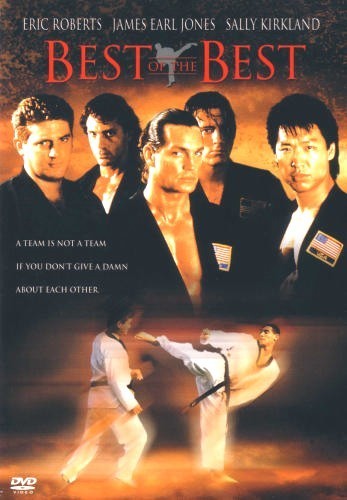
Recently, a major production company with some well-known titles under their belt optioned a script Phillip Rhee and I wrote and developed together at the end of 2004 called, “Champions” — a very inventive, fun, and action-filled, martial arts/sports movie that has an extremely cool signature concept to it. The new production company has hired a writer they know to rewrite it and update it with the intention of using it to reboot Phillip Rhee’s signature series “Best of the Best” as a major motion picture franchise.
One of the few Hollywood people I know who is not a dick is Phillip Rhee, the writer, creator and sometimes director of the cult-classic “Best of the Best” movies that always seem to be on cable somewhere. Phillip’s a friend, a really good guy, and he and I have collaborated on developing many script projects over the years.
There was even a period of time in what feels like my previous life that all I was writing were scripts on assignment from Phillip’s production company. As I’ve previously written about in the foreword for my last-hitman-standing thriller “Number One with a Bullet,” we had optioned that script to some bigwig and yada, yada, yada… Thing is, along with his other endeavors and businesses, he was putting all of these projects into play and continued to even as I fell face-first into new media and that whole Sirius/podcasting/TV part of my life and then into publishing, etc.
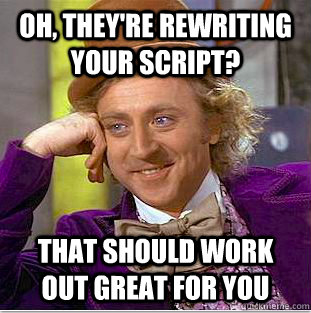 So what does this all mean? No clue at this point and I’m not going to speculate publicly, because this news and a buck fifty will get you bus fare. I have a signed contract that covers the work I’ve done, its future disposition, etc… and I know what it says. Now, we wait.
So what does this all mean? No clue at this point and I’m not going to speculate publicly, because this news and a buck fifty will get you bus fare. I have a signed contract that covers the work I’ve done, its future disposition, etc… and I know what it says. Now, we wait.
So, stay tuned. If anything should come of this at all, I’ll let you know. As the late, greatl Don LaFontaine would have said: In a world where tons of scripts get developed, this is one of them…









March 18, 2013
Why do you want to publish a book?
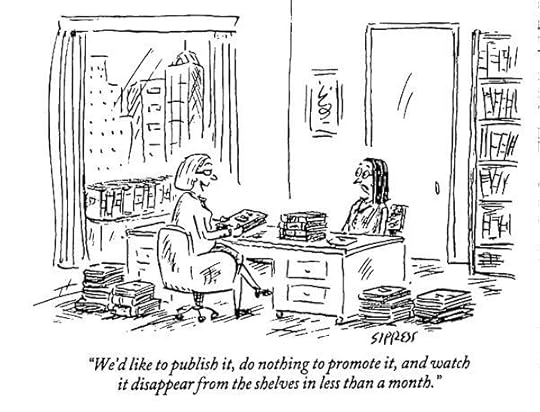 Be honest. Do you want to publish a book to impress people or to make a living as a writer?
Be honest. Do you want to publish a book to impress people or to make a living as a writer?
If your heart is set on seeing your name on the cover of a book published by a traditional publisher, then go after it with everything you have. Chase it like a dog after a pork chop.
Just realize that today, self-publishing success has become an opportunity to gain the attention of traditional publishers. It’s the new way to fight the crowded bottleneck of all those millions of others out there trying to do the same exact thing. Success in any field doesn’t go unnoticed for too long.
Of course, traditional publishing isn’t without its pitfalls. As an industry facing a great deal of uncertainty, traditional publishers have tightened the reins. New contracts can include provisions that mean less control of your work, and worst-case-scenario, even loss of your copyright regardless of whether or not your book even comes out. Feeling frisky about an education into the horrors faced by writers under contract to publishers? Go visit ThePassiveVoice.com, a site run by a lawyer who has worked in the publishing industry for decades. Often, he highlights the egregious things found in the publishing agreements sent to him by writers under contract. One thing is clear. Publishing is an industry facing drastic shrinkage, where sometimes the most creative work done by the publishers involves dreaming up inventive new ways to upend the writer by the ankles and shake until more money falls out from their pockets.
Regardless, with a publisher behind your book you may even be forced to wait 12 to 18 months to be released. In some cases, books are never released for whatever reason… even after the contracts are signed. This is the pure definition of literary blue balls.
Plus, to make things even more difficult for the writer to make a living doing what they do best, uh, writing…the contract you affix your John Hancock to may prohibit you from, uh, writing anything else. At the very least, you will be under embargo against competing against yourself.
All in exchange for an advance and the hope there will be more royalty checks coming.
How big of an advance? Well, it seems the days of windfall advances to new writers is past history. Today, advances for new writers now average in the mid-five figures and are shrinking faster than Luke Skywalker’s junk after a cold dip in a Degoabah swamp. Now, I realize that a few thousand bucks may represent a life-changing sum of money for some, but it seems a paltry sum to sign away nearly all control of something you devoted so much of yourself to create.
You also have to take into account that your advance is recoupable against future royalties. That means the 8 to 10 percent royalty per unit sold they’ve given you in that contract has to earn back every penny of that advance money before you see another dime. That is if you even get an advance. Some publishers have started to move away from handing out any upfront dough and are instead basing their deals on royalties alone.
In a way, it’s almost like religion. It’ll work out better for you if you have faith there’s a reward at the end.
Yes, dear writer, the deck is stacked against you. However, those awful publishers put up the financial risk and you signed the contract allowing them to do whatever they want.
A deal with a major publisher can open doors for you. Maybe even lead to bigger opportunities. The sad truth is that because publishers release so much content every month, not every one of their books will succeed and not every writer under contract will make a living. Some writers succeed with major publishers and go on to have those careers the rest of us drool over. Most however, do not. That’s the way it has always been.
Can you make a living self-publishing? Yes.
Be your own boss. Write what you want to write. Be on your own schedule. Just remember… if you don’t sell books, you don’t make money.
How much can you make through self publishing your own books?
Possibly the best-known examples of DIY self-publishing success are John Locke and Amanda Hocking. Both were making six figures, monthly, on their self published books. That’s right, hundreds of thousands of dollars a month! Look it up. Both eventually signed big deals with major publishers. Google the term: “self-publishing success” and you’ll find the latest person to use their self-publishing efforts as an audition to land a major book deal — because a writer with an audience and the know-how to make it happen on their own is a much more attractive proposition for a risk-adverse industry.
The good news is that you don’t have to be today’s buzzed-about indie author to make a decent living at this. Because e-books are being sold today in mind-blowing numbers, you can stay under the radar and still move enough units each month to make a living. It takes luck and perseverance and a growing catalog of content.
Me? I’ve had my own indie publishing imprint since 2005, and have been doing this full time for the last two years. I can tell you it’s thrilling to be able to write what you want, how you want and sell it to book buyers without a middleman screwing everything up or putting their hands in your pocket.
If you could do anything in the world, anything at all, what would it be? Personally, I’d want to do exactly what I’m doing now. The only difference is that it would be from a desk with a view of the beach.
*****
I’m a full time writer, publisher and digital content creator. I’ve been marking the 8th anniversary of the launch of my indie imprint, Glenneyre Press by sharing some of what I’ve learned about about digital publishing.









March 12, 2013
The Beauty of (Indie) Self Publishing
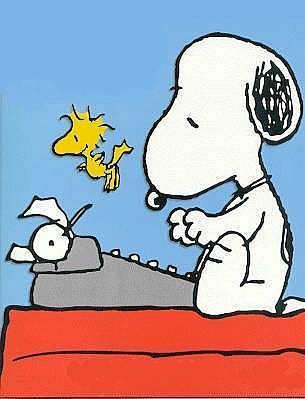
An oversimplified way to describe self-publishing is that you upload finished files to certain websites and they in turn download money into your bank account. Everything is done digitally and there’s hardly any overhead. With e-books and POD, there is no warehousing or product fulfillment.
Just files and royalties.
One of the major ways you succeed in the modern age of content distribution is through disintermediation—taking out the middleman. By having the ability to go right to the customer via a distribution network like Amazon or Barnes and Noble, I not only keep more control over my products, but also pocket more profit.
Truth is there is no ceiling on how much you can make. You are only limited by your potential.
How cool would it be to make enough to pay for a family vacation? Or make your car payment every month? Ask any writer. There is no sweeter money than a royalty check for your book sales.
Before we go too far down this yellow brick road, let’s be clear with one thing when it comes to self-publishing. You need to know it will be a labor of love at first.
The hardest thing in the world is going from zero to one mile per hour. Making regular money doing anything creative requires a certain amount of momentum. If you are starting from scratch, i.e., you have never published a book, or anything else, and you have never created anything for the internet and don’t currently have a following or audience, you really do have your work cut out for you for sure.
You can’t go into this with the expectation that you are going to publish your first book to the Kindle and the money will start pouring in. It takes time and effort to build a successful publishing platform.
Let’s set some expectations. What are your lofty goals? If you want to make a living, you have to start somewhere.
How about selling 100 copies of your book to begin with?
That would be a “win” in indie publishing. What else would be a win? Remember victories are relative.
A win is any time you can look at a positive outcome from your efforts that in some way moves the needle, no matter what that needle is.
A win is releasing your first book
A win is selling the first copy of your first book.
A win is hitting any bestseller chart for the first time
A win is hitting #1 on any bestseller chart anywhere.
You want to make money doing this, right? Remember, a few books a day adds up. If you can put yourself in a position where each book sale will net you 2 bucks in profit, then what happens if you sell 5 copies a day, every day for a whole month?
What if you could sell 5 on Amazon. 1 on BN, 2 in the iBookstore, 1 on Kobo… all of a sudden, that’s 9 or 10 books a day…
$20 a day, 30 days = $600
You can build on that momentum and hopefully turn 5 copies a day into 7 and then 10 and then 20, 30, 50 and more. That’s how you make money self-publishing. You may not recoup your investment in a book for a while. It may take months or longer, but once you can go into the black, it’s all profit from there.
Just from uploading some files. That’s the beauty of self-publishing.
March 2013 marks the 8th anniversary of the launch of my indie publishing imprint, Glenneyre Press, an indie publishing imprint I started in 2005 with zero experience and lots of preconceived notions… which were wrong. Since 2011, it has been my full time gig.















